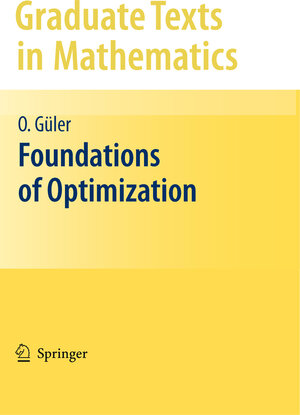
From the reviews:
“This book is an advanced graduate level text on the mathematical theory of optimization. … filled with many useful examples and counterexamples that provide intuition to support the more formal theorems and proofs. … There are also numerous exercises for the student. … The book will also be useful as a reference for researchers working in various areas of optimization.” (Brian Borchers, The Mathematical Association of America, October, 2010)
“Güler’s book … is intended for postgraduates or researchers in optimization theory; however, it is also suitable as a textbook in a first-year graduate level course. The book covers a wide range of mathematical tools and results concerning the fundamental principles of optimization in finite-dimensional spaces. … this book can be a solid reference textbook, useful for graduate students in applied mathematics, economics, engineering, operations research, etc., and, more generally, for anyone wishing to learn the essential mathematical principles of optimization theory.” (Giorgio Giorgi, Mathematical Reviews, Issue 2011 e)
„... this textbook presents the state of the art in the theory of continuous optimization in a very transparent and accessible way. Several results are proved in two or more independent ways to gain further insight into the problem structure, and to provide instructors with alternative ways of exposition. The book may be warmly recommended to graduate students and researchers in optimization, operations research, and other fields which apply optimization methods.“ (Zentralblatt Math, 2010)
Foundations of Optimization
von Osman GülerThis book is intended as a textbook to be used in a first graduate level course, and covers the fundamental principals of optimization in finite dimensions. It develops the necessary background material in multivariable calculus using coordinates as well as in a coordinate-free manner, so that the recent developments such as semi-definite programming can be dealt with ease. All the standard topics of mathematical programming, such as necessary and sufficient optimality conditions for optimality, convex analysis and duality, are covered in great detail, often from multiple points of view. A distinctive feature of this book is its set of worked-out examples and problems, including hundreds of well-chosen problems and important examples. It will be of benefit for graduate students and researchers in optimization, operations research.



